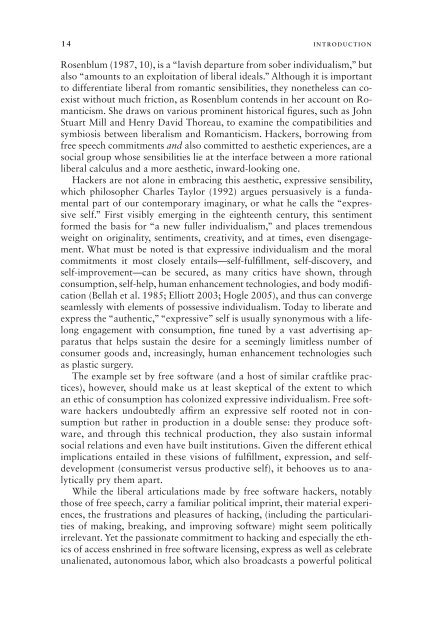V2TXZi
V2TXZi
V2TXZi
Create successful ePaper yourself
Turn your PDF publications into a flip-book with our unique Google optimized e-Paper software.
14 INTRODUCTION<br />
Rosenblum (1987, 10), is a “lavish departure from sober individualism,” but<br />
also “amounts to an exploitation of liberal ideals.” Although it is important<br />
to differentiate liberal from romantic sensibilities, they nonetheless can coexist<br />
without much friction, as Rosenblum contends in her account on Romanticism.<br />
She draws on various prominent historical � gures, such as John<br />
Stuart Mill and Henry David Thoreau, to examine the compatibilities and<br />
symbiosis between liberalism and Romanticism. Hackers, borrowing from<br />
free speech commitments and also committed to aesthetic experiences, are a<br />
social group whose sensibilities lie at the interface between a more rational<br />
liberal calculus and a more aesthetic, inward- looking one.<br />
Hackers are not alone in embracing this aesthetic, expressive sensibility,<br />
which philosopher Charles Taylor (1992) argues persuasively is a fundamental<br />
part of our contemporary imaginary, or what he calls the “expressive<br />
self.” First visibly emerging in the eighteenth century, this sentiment<br />
formed the basis for “a new fuller individualism,” and places tremendous<br />
weight on originality, sentiments, creativity, and at times, even disengagement.<br />
What must be noted is that expressive individualism and the moral<br />
commitments it most closely entails— self- ful� llment, self- discovery, and<br />
self- improvement— can be secured, as many critics have shown, through<br />
consumption, self- help, human enhancement technologies, and body modi� -<br />
cation (Bellah et al. 1985; Elliott 2003; Hogle 2005), and thus can converge<br />
seamlessly with elements of possessive individualism. Today to liberate and<br />
express the “authentic,” “expressive” self is usually synonymous with a lifelong<br />
engagement with consumption, � ne tuned by a vast advertising apparatus<br />
that helps sustain the desire for a seemingly limitless number of<br />
consumer goods and, increasingly, human enhancement technologies such<br />
as plastic surgery.<br />
The example set by free software (and a host of similar craftlike practices),<br />
however, should make us at least skeptical of the extent to which<br />
an ethic of consumption has colonized expressive individualism. Free software<br />
hackers undoubtedly af� rm an expressive self rooted not in consumption<br />
but rather in production in a double sense: they produce software,<br />
and through this technical production, they also sustain informal<br />
social relations and even have built institutions. Given the different ethical<br />
implications entailed in these visions of ful� llment, expression, and self-<br />
development (consumerist versus productive self), it behooves us to analytically<br />
pry them apart.<br />
While the liberal articulations made by free software hackers, notably<br />
those of free speech, carry a familiar political imprint, their material experiences,<br />
the frustrations and pleasures of hacking, (including the particularities<br />
of making, breaking, and improving software) might seem politically<br />
irrelevant. Yet the passionate commitment to hacking and especially the ethics<br />
of access enshrined in free software licensing, express as well as celebrate<br />
unalienated, autonomous labor, which also broadcasts a powerful political


